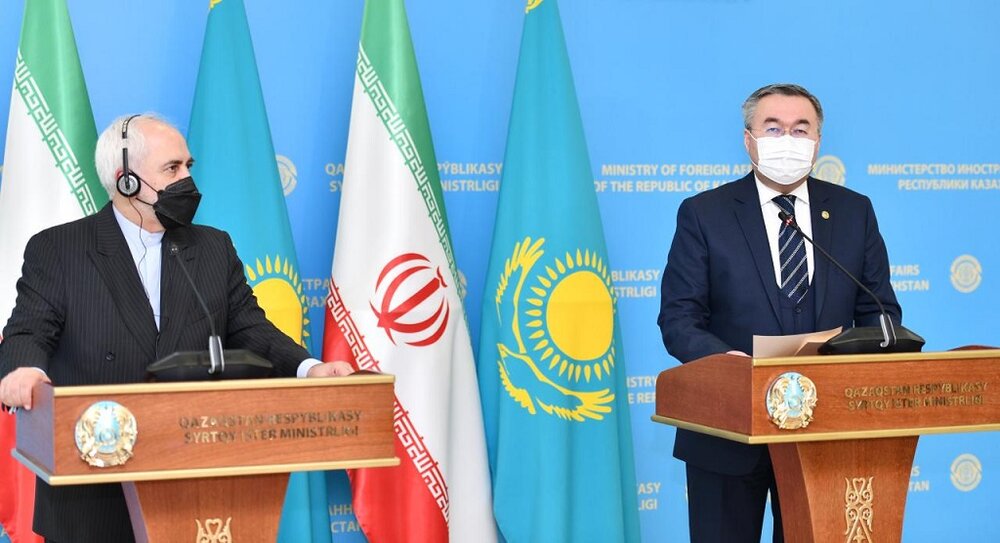FM Zarif holds talks with Kazakh leaders

TEHRAN – Iranian Foreign Minister Mohammad Javad Zarif met with Kazakh leaders including President Kassym-Jomart Tokayev and Foreign Minister Mukhtar Tileuberdi.
Zarif and Tokayev discussed issues of mutual interest, the Iranian Foreign Ministry said in a statement on Wednesday.
“During the meeting, our country’s foreign minister considered Kazakhstan as a friend and neighbor in the Caspian Sea and assessed the proximity of the two countries' positions on regional and international issues as important. Dr. Zarif considered it necessary to try to find ways of lasting cooperation to maintain and expand relations between the two countries,” the statement said.
“Underlining the common history and importance of developing cooperation with our country, the President of Kazakhstan Kassym-Jomart Tokayev called the Islamic Republic of Iran a key partner in the region and stressed the need for comprehensive expansion of relations in the economic and political sectors,” it continued.
Zarif and Tileuberdi also “discussed the current state and prospects for the development of bilateral cooperation, as well as topical issues on the regional and international agenda. The ministers discussed ways to increase trade and economic cooperation,” according to a statement issued by Kazakhstan’s Foreign Ministry.
“They focused on the need to coordinate joint work on the development of the Caspian region. The parties also positively assessed the cooperation within the UN, CICA, OIC, ECO and other international organizations, and agreed to continue working in this direction. As a result of the negotiations, the parties signed a Cooperation Program between the Ministries of Foreign Affairs of the Republic of Kazakhstan and Islamic Republic of Iran,” the statement added.
While in Kazakhstan, Zarif also delivered a speech at the 19th D-8 Council of Ministers Meeting, which was held virtually.
Zarif started his speech by thanking Bangladesh for “excellent arrangements for this meeting” and then railed against U.S. sanctions on Iran.
“The international community is still facing the unprecedented challenge of the Covid-19 pandemic. For Iran, the challenge has been compounded by a barbaric economic terrorism against the great Iranian nation, a grave crime against humanity,” the Iranian foreign minister said.
He added, “Much as the international community eagerly wants to consign Coronavirus to the dustbin of history, the pandemic has taught us some valuable lessons. We learned that how a health crisis can easily lead to an economic crisis, a humanitarian crisis, an education crisis, a food security crisis, an inequality crisis (to name a few), leaving a disproportionate toll on developing and least developed countries. Concurrently, we also learned how a global crisis can unleash the blessings of solidarity among nations. Let me seize this opportunity to value support the Islamic Republic of Iran received from our brotherly D-8 countries during the time of pandemic and amid unlawful and cruel sanctions. Another lesson we have learned is that the enhanced cooperation among countries and regions is the optimal choice should the international community wish to set the stage for shared challenges that loom ahead. Multilateral machineries, including the D-8, provide us with a pool of choices to make.”
The chief Iranian diplomat stated, “I am not going to elaborate on the shared challenges ahead of us. Rather, I would like to focus on decisive choices we can collectively make within the D-8 existing and potential frameworks for cooperation. This is also very important and pertinent as we are about to finalize the D-8 Decennial Roadmap.”
He urged D-8 countries to boost intra-D8 trade and play the role of enabler. He also underlined the need to enhance connectivity among these countries.
“Notwithstanding the geographical remoteness of some D-8 countries, D-8 can be an inter-connected body of countries. This can be and should be realized in terms of, among others, multi-modal transport and port cooperation; cultural affinity and tourism; and business-to-business connectivity,” he noted.
SM/PA
Leave a Comment